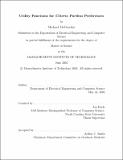Utility functions for ceteris paribus preferences
Author(s)
McGeachie, Michael J
DownloadFull printable version (517.7Kb)
Other Contributors
Massachusetts Institute of Technology. Dept. of Electrical Engineering and Computer Science.
Advisor
John Doyle.
Terms of use
Metadata
Show full item recordAbstract
Ceteris paribus preference statements concisely represent preferences over outcomes or goals in a way natural to human thinking. Many decision making methods require an efficient method for comparing the desirability of two arbitrary goals. We address this need by presenting an algorithm for converting a set of qualitative ceteris paribus preferences into a quantitative utility function. Our algorithm is complete for a finite universe of binary features. Constructing the utility function can, in the worst case, take time exponential in the number of features. Common forms of independence conditions reduce the computational burden. We present heuristics using utility independence and constraint based search to achieve efficient utility functions.
Description
Thesis (S.M.)--Massachusetts Institute of Technology, Dept. of Electrical Engineering and Computer Science, 2002. Includes bibliographical references (p. 101-103). This electronic version was submitted by the student author. The certified thesis is available in the Institute Archives and Special Collections.
Date issued
2002Department
Massachusetts Institute of Technology. Department of Electrical Engineering and Computer SciencePublisher
Massachusetts Institute of Technology
Keywords
Electrical Engineering and Computer Science.